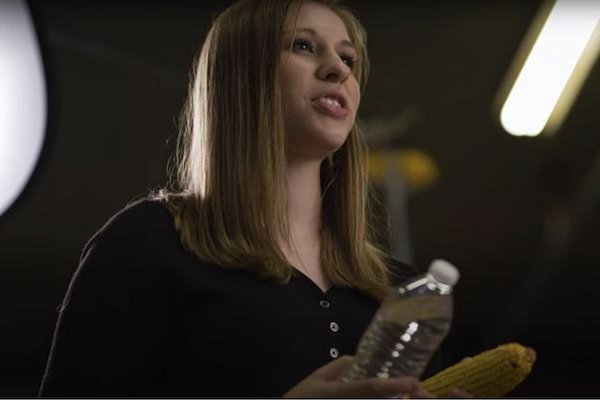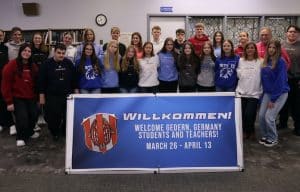Local stars in Super Bowl ad promoting bioplastics

Alexis Hartman of Waterloo imagines a cleaner, greener future where corn-based bioplastics are the norm in an Illinois Farm Families commercial that aired across the region during Sunday’s Super Bowl. For more, visit watchusgrow.org.
During Sunday’s showing of America’s biggest football game, Monroe Countians were greeted with a familiar face asking viewers to imagine a future where plastics are not made from petroleum, but corn.
Waterloo’s Alexis Hartman, a sixth generation farmer, starred in the Illinois Farm Families commercial. Illinois Farm Families is a coordinated effort between the Illinois Farm Bureau and different commodity groups, including Illinois Corn Growers, to promote consumer education of the agriculture industry.
Hartman’s father, Ken Hartman Jr., serves on the National Corn Growers Association Board and was formerly president of the Illinois Corn Growers. The Hartmans grow corn, soybeans and wheat on their Waterloo farm.
“I had been in an NBC interview with my dad that was about how the economy affects different industries, especially how the trade wars affect agriculture and farmers. It turns out the marketing people at Illinois Corn Growers had seen it and liked the idea of having a young, woman farmer’s perspective,” Alexis told the Republic-Times, stating the association then contacted her about the video.
The 30-second Super Bowl commercial is a condensed version of a previous Illinois Farm Families informational video and aired Sunday night on stations across Illinois and St. Louis.
In this short amount of time, the commercial presents a startling statistic: over 1 billion plastic water bottles – traditionally made from petroleum – are bought each day across the globe, the vast majority of which are not recycled.
“There is a lot of research being done on the different ways corn can be used for everyday items, from gas (also known as ethanol) to plastics,” Alexis said. “Using stuff like corn is a better alternative because it is a renewable resource. It can be grown and used and we don’t have to worry about it running out – unlike petroleum, which plastic is usually made from. That petroleum resource is not good for the environment and it will eventually run out.”
While Illinois Farm Families’ website states plastic water bottles are not able to be widely made from corn-based bioplastics, products like takeout containers, hot cups, straws and even golf tees can.
The development of such products is where the National Corn-to-Ethanol Research Center comes into play.
“One hundred percent of the work that we do at NCERC is focused on taking agricultural products, or an agricultural commodity like corn, and converting that corn or converting that agricultural product into a biorenewable, clean green product,” NCERC Executive Director John Caupert of Waterloo said. “While corn-based ethanol is still kind of the foundation of all of our work, today it’s just a portion of a complete portfolio of biorenewable products, which obviously includes things like bioplastics. Every product, every technology, that we assist in commercializing means a new opportunity for Illinois farmers and the corn that they grow.”
Caupert said in addition to the environmental benefits of corn-based bioplastics – including easier decomposition in nature and more – it and other biorenewable products yield exciting economic opportunities.
“The overwhelming majority of this work is being done right here in the United States. There are nearly 400,000 direct and indirect jobs that have been created in the last decade alone in the biorenewable space,” Caupert said.
And this field is continuing to grow.
“This is a very, very exciting career area and frankly, we haven’t even scratched the surface of what’s going to occur over the next 20-30 years,” Caupert said.
Caupert noted that by the U.S. exploring more corn-based biorenewable plastic alternatives, the nation will become more energy independent.
“Every time that we walk into a grocery store and we pick up a case of bottled water or whatever it is, the overwhelming majority of those products are petroleum-based products. As we convert to more of a biorenewable economy, that lessens our dependence on those imported petroleum sources,” Caupert said.
Caupert said education – among consumers and politicians alike – is the key to making a future where corn-based plastic alternatives dominate a reality.
“Today in America, less than half of 1 percent of our citizens live on a farm; that’s one out of every 200 people that live on a farm. In the agriculture community, the farming community, we do a great job of talking to each other about what we’re doing, but I’m not sure that we’ve done a great job talking to those outside our community of fellow farmers,” Caupert said. “The better job that we can be doing in educating and informing America’s consumers on what we’re doing in the biorenewable space, I think the better off we all are.”
Alexis said she hopes the TV commercial opens the eyes of those not involved in agriculture to the ever-expanding field.
“I hope that people see how much of an impact agriculture has on the world,” Alexis said. “Agriculture doesn’t just grow food for the world but can be used as a better alternative to many of the items we use every day. It’s more than just tractors and growing crops – it’s science and engineering.”
To view the full Illinois Farm Families “Growing a Better Environment with Bioplastics,” visit watchusgrow.org/homegrown-corn.






